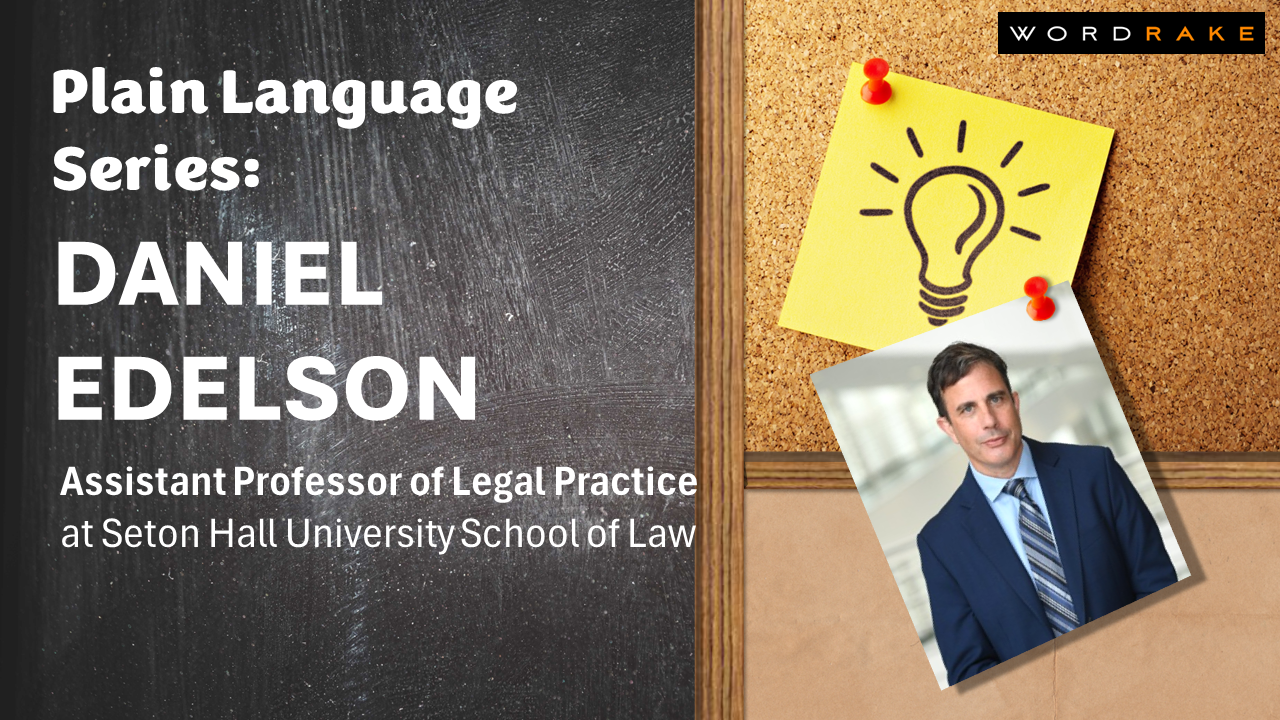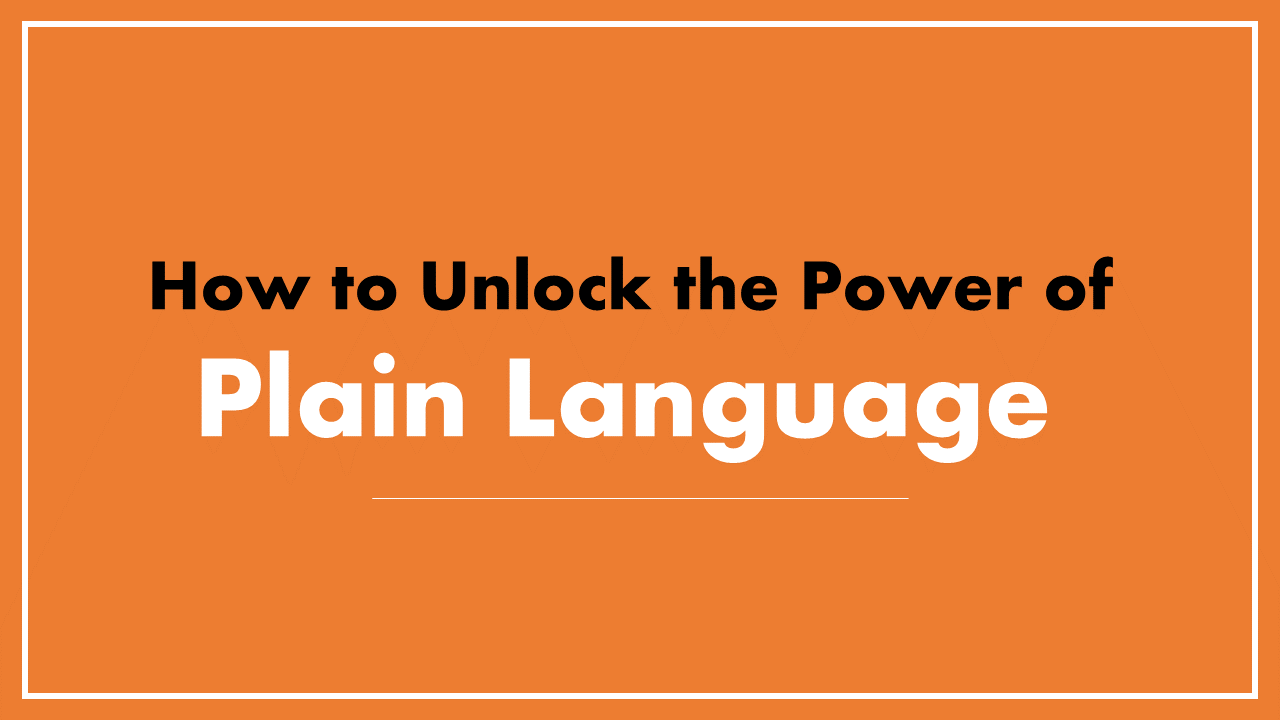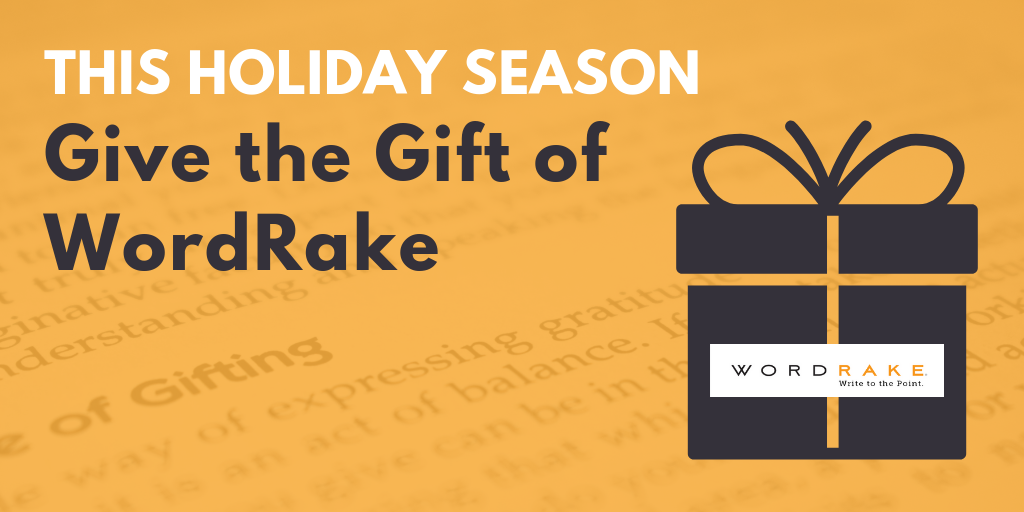The decision to write in plain language is usually a simple matter, but is it always the best choice? Professor Daniel Edelson of Seton Hall University School of Law is a proponent of plain English, but he cautions that it may be more difficult for professionals who have learned English as a second language to understand. He shares his tips for communicating clearly with non-native English speakers in this interview for International Plain Language Day.
What is your role and how is it connected to clear communication?
I teach legal writing and academic skills to J.D. and LL.M. students at Seton Hall University School of Law. In addition, I teach legal English and US law online to students around the world. I am responsible for teaching students to communicate in a way that will meet the expectations of the US legal profession.
At the same time, as a teacher, and as someone who creates online educational content, I am responsible for communicating in a way that is clear and comprehensible for my students.
What were some of the most valuable insights about communication that you gained from your time living and working abroad in Japan and South Korea?
I learned that I’m not very good at languages and that I really appreciated people who were patient with me. And I learned how important it is to be patient and supportive when people are trying to speak to me in English.
A few skills that I think are important when speaking to people who don’t speak English as a first language:
- Regulate speed and word choice. Speak naturally, but with sensitivity to your audience.
- Stop talking so much. The lengthy explanation of what you were trying to say only makes things more confusing. Try to clarify a specific source of misunderstanding. Sometimes only one word in a sentence can throw off the whole conversation. So if you can clarify that word, you’ll repair the conversation.
- If you’re asked to repeat yourself, do that. As best you can, word-for-word. Don’t assume you know which part of the sentence was confusing. Hearing the same sentence again might be all the other person needs.
And as for tips to help people pick up a language:
People can learn a lot by reading. Not necessarily a language book. For a beginner, children’s books are perfect.
What connections do you see between writing for lawyers, English as a Second Language, and the plain language movement? How do you see these fields working together to promote clarity and equity?
I’m hesitant to say the fields should all work together because they seem different to me, although they might all have clarity as a goal.
For students learning legal English, I don’t really emphasize plain language. Students need skills to understand the legal English they will encounter regardless of whether it is written as plain language. By way of example, the Constitution of the United States is relatively short, but it’s not an example of plain language. When students who do not speak English as a first language study our Constitution, they’ll need to read the original text and work with the text as written.
That said, I’m an avid supporter of plain English and I am persuaded that it is a civil rights issue. Almost everything in law can and should be explained in a way that is readily understandable. On a side note though, I am not convinced that everything that is presented to me as “plain English” really captures the meaning of the “legalese.” Sometimes I see examples of “plain English” that gloss over the nuances of the original legal text. It just goes to show how difficult plain English can be to get right.
Of course, when teaching legal English we want the students to speak and write comprehensibly and clearly. And that goal dovetails with the goals of “plain English.” But if a student does not have a very strong English language background, the difference between “plain English” and legalese will not be intuitive and emphasizing the importance of plain English will probably not be very helpful.
How can other lawyers help clients who speak English as a second language? What should lawyers know about ESL processing that would help them better serve clients?
Speak naturally but a bit more slowly. Avoid jokes, slang, or tricky cultural references that would require a non-native speaker to focus on too many things while also trying to process the legal information you’re providing.
Long lengthy explanations are usually not going to help. Break things down and check for understanding.
Listen. Take time for questions. Give the client extra time to form questions and comments.
How can professors help students who speak English as a second language?
Depending on the students’ schedule, I would encourage the student to read for enjoyment as much as possible. The student should read material that is easier to understand than the class material.
Don’t worry about correcting every grammatical mistake, it probably won’t help and might be too time-consuming for you. However, if you identify a recurring issue that would prevent the student from meeting academic expectations, you could help the student by pointing out the issue and providing specific instructions on how to correct it. If you’re not sure of the best way to correct the issue, you might be able to speak with an ESL teacher at your university for tips on correcting that particular issue.
You can make assessments more fair for international students by avoiding slang or deep cultural references. When providing critical information concerning the subject you are teaching, avoid slang and cultural references that could prevent an international student from understanding.
Give yourself a break. There will be times when an international student won’t catch every nuance, joke, cultural reference, etc. And that’s wonderful. Because you’re giving them an opportunity to learn more about you, your background, your other students, and your mode of discourse.
Do you believe plain English requirements are different when the reader is not a native English reader? If so, how are they different? If not, explain why they are not.
They’re probably different. I’ve known professionals from other countries who understand scientific or technical terms in English that I don’t understand. But they would have trouble with a “plain English” version of these terms. So plain English can be more challenging for some students than technical English.
Similarly, someone who does not speak English as a first language will almost certainly find it difficult to shift from legalese to plain language and back to legalese. Students who can’t draw on the same vocabulary and cultural resources as students who grew up speaking English will engage with “plain English” differently.
What’s the most important—yet simple—change professionals can make to documents to improve understanding?
I don’t have a one-size-fits-all for this so I can’t really say. But have a reader in mind. I imagine a smart first-year high school student. The student is not very patient but will stick with me so long as everything is cohesive and understandable.
What’s the biggest danger to second language English speakers if they don’t understand what is being communicated to them?
I don’t know the biggest danger but obviously, both native and non-native speakers sometimes do not understand what is being communicated to them. The biggest disadvantage for non-native speakers in those types of situations is they may not have the same language skills to assess whether they correctly understood something or not. And they also may not know whether something they found confusing was critical or not. So if they don’t ask, or signal their confusion, it’s more likely that a critical misunderstanding won’t get corrected.
What’s one piece of advice that you would offer to help a professional starting to serve the ESL community?
Be patient and wait for people to respond to your questions. Even if it takes longer than you are used to waiting.
What’s something new that you are working on that you find exciting?
This year I collaborated with people on a number of projects but I’ll just list one:
Dr. Lindsey Kurtz, a linguist who is the Director of the Legal English Certificate Program at Penn State, Stephen Horowitz, a professor of legal English at Georgetown University Law Center, and I developed a legal English assessment test for LL.M. candidates We were then asked to administer the assessment for a cohort of female Afghan judges who were forced to flee their country and are now in the process of matriculating at US law schools. Even more exciting is that we now have the opportunity to use the legal English educational resources available at USLawEssentials to help the students improve their legal English before beginning their studies.
About Daniel Edelson
Daniel Edelson is the founder of USLawEssentials and an assistant professor and Director of Academic Success at Seton Hall Law School. He creates online educational content to help international students and attorneys learn legal English and US law and also teaches legal English courses both online and in person. Daniel is the co-host of the USLawEssentials Law & Language podcast with Professor Stephen Horowitz with whom he also often co-teaches. Among other things, he has also recently worked with Professor Horowitz to create online legal English courses for students from politically disrupted countries.
Daniel practiced commercial litigation in New York and New Jersey and before becoming an attorney he taught English as a Second Language. His international experience includes living and working in Japan and South Korea. You can find him on LinkedIn.
About WordRake and International Plain Language Day
Plain Language experts Cheryl Stephens and Kate Harrison Whiteside created International Plain Language Day on October 13, 2011 to celebrate the first anniversary of the signing of the Plain Language Act in the United States. Since then, plain language enthusiasts take time each year to celebrate the gains the movement has made.
In October 2022, WordRake celebrated Plain Language Day by releasing their new Simplicity editing mode to help comply with plain language laws. As firm believers in the importance of clear communication, WordRake celebrates October 13th by highlighting experts and leaders in the plain language field. To see how WordRake can help you simplify your writing, take a 7-day free trial today!






